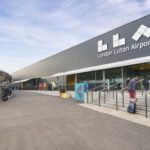Manchester Airports Group (MAG), which also runs London Stansted and East Midlands Airports, has launched a new Jet Zero Curriculum with sustainability lessons delivered at the hub’s on-site Aerozone.
The curriculum, which is delivered in an online, interactive format, teaches young people about Sustainable Aviation Fuel (SAF) – how it is made, and how it can be used by the aviation sector to reach MAG’s target of net zero by 2038 and the UK industry target of 2050.
It will be delivered to pupils at the airport’s Aerozone – a dedicated on-site centre for schools from the North West to visit and do themed lessons teaching them about various elements of the aviation industry.
Jet Zero Curriculum
Delivering the curriculum was part of the Group’s Jet Zero Education pledge – one of five made in July 2022 when the UK Government published its Jet Zero Strategy. MAG’s other pledges were Jet Zero Research, Jet Zero SAF, Jet Zero Airspace and Jet Zero technology – all of which will contribute to the decarbonisation of the aviation sector.
It comes as Manchester Airport published its annual Corporate Social Responsibility (CSR) Report for 2022-23. The Report details the airport’s progress over the last financial year in delivering on its CSR Strategy ‘Working together for a brighter future’, published in 2020.
It highlights what it has delivered over the past year, including the partnership Manchester Airport signed with HyNet in November 2022, which would make it the first UK airport with a direct supply of Hydrogen fuel by the mid 2030s, donating over £170,000 to local causes through our Community Trust Fund and supporting people’s education and careers through our airport academy.
The first Jet Zero session took place last week at Manchester Airport, with students from supported learning provider Pure Innovations immersing themselves in the online learning tool which took them through the SAF production process.
Manchester Airport Group
Manchester Airport Group CEO Ken O’Toole said: “I am so pleased to see our Jet Zero curriculum become a reality this week as the first students learn about the role of Sustainable Aviation Fuel, in our airport Aerozone.
“We know grassroots education about a sustainable future for aviation will be integral to the future success of our sector, and we’re delighted to have delivered on this pledge. It will see thousands of young people learn more about the decarbonisation of our industry.
“We are committed to reaching net zero carbon operations by 2038, and to working with airline, industry and government partners to reach net zero for UK aviation by 2050. Our sector has a clear and achievable plan to deliver that decarbonisation and, working with the Government through the Jet Zero Council, as MAG we will continue to lead on making net zero aviation a reality.
“We understand just how wide ranging the benefits of international travel are – from tourism and cultural exchange to global trade and investment – and that is why we are dedicated to ensuring that passengers can continue to enjoy them as part of the net zero future of our industry.
“As we publish our annual CSR Report, I am proud of the progress we continue to make across all three of our strategic priorities – ensuring we are playing our part in decarbonisation, providing impactful education and employment opportunities, and listening to our local communities and supporting their causes.”
Subscribe to the FINN weekly newsletter
You may also be interested in:
Funding boost for international partnerships and STEM education

